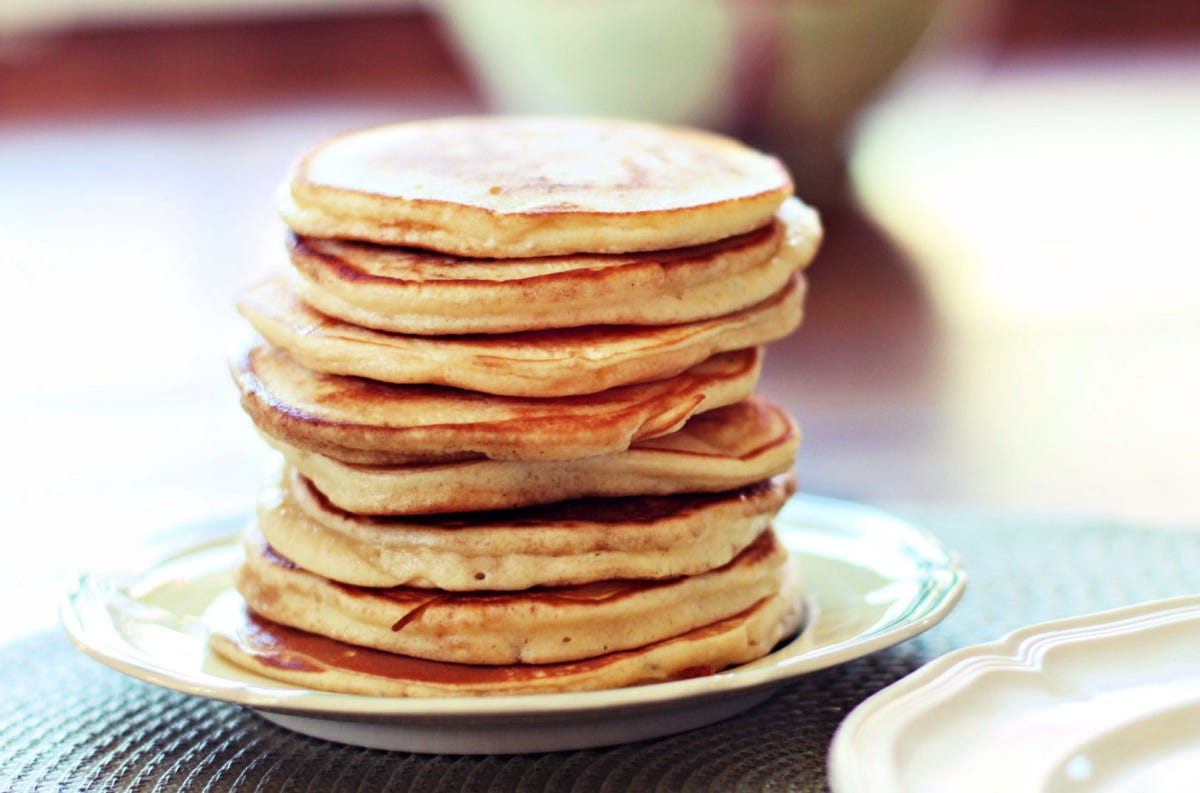Start Lent This Week With Pancakes 🥞
Let's shrove it up on Tuesday...
Ash Wednesday is this week, which means we’re officially entering the season of Lent. I never in a million years thought I’d ever say this, but: FINALLY. Finally!
I’ve heard from more than a few people that actually feel ready for Lent after several years of feeling like we’re sorta-kinda constantly living in a lowercase-lenten season (I feel similarly, even though as someone with a rather melancholy disposition anyway I’ve long gravitated to this reflective season).
Lent isn’t about self-improvement, punishing ourselves, or turning the spiritual life into a checklist. It’s about a denial of something temporary in order to make room for something better. If we take that on in bodily form by way of a fast, we’re saying ‘no’ to a particular dependence in our lives so we are better able to say ‘yes’ to God. We’re quieting our appetites so we can better hear God’s voice. We’re making ourselves more available for what really matters.
In the liturgical calendar, we never see a season of fasting without also a season of feasting, so Lent is about preparation for the feast that follows — Eastertide, a full fifty days of reveling in Christ’s victory over death. This Wednesday, we’ll have ashes smudged on our foreheads as we hear a fellow sojourner on earth proclaim over us, “To dust you came, and to dust you shall return.” …A rather poetic, jarring way to remind us that we’re going to die and that life is short.
It’s the first bookend of Lent, with its companion 46 days later at the end of Holy Week, when we’re reminded by Easter that the death we acknowledged on Ash Wednesday? That’s not all there is, in fact. That death we remembered with ashes? It’s lost its sting. The fast you participated in during the days in between? It’s there to remind you that your human body, walking this beautiful shadow of an earth, is merely a glimpse of what’s to come.
Spoiler alert: You will screw up Lent. You won’t participate perfectly in your fast. But this is okay, because this isn’t the point. We take on whatever God gives us during Lent in order to better participate in the redemptive life of Jesus while we still have air in our lungs. It’s all grace, every last bit of it, from start to finish.
Shrove is an Actual Word
The day before Ash Wednesday is traditionally known as Shrove Tuesday. We have historic references as old as the 11th century AD that Christians would use up their rich, fatty foods like butter and eggs the day before Lent in order to prepare their homes for their season of fasting (this is also where we get the term "Fat Tuesday," or Mardi Gras — it's the same day). Traditionally, pancakes were the most common peasant fare to use up these pantry staples. To "shrive" in Old English meant to confess and receive absolution for your sins and to then receive wisdom and counsel from your spiritual leader. Having done this, you'd been "shrove."
(Feel free to use this in your everyday vernacular to confuse impress your friends.)
If you haven’t yet done so, start a new family tradition of breakfast-for-dinner on Shrove Tuesday! It’s one of our favorite simple family traditions to prepare for the next day’s start of Lent, and who doesn’t love pancakes for dinner?
There’s zero shame in the pre-made boxed mix game (I’m a fan of King Arthur’s), but I’m also sharing with you here my go-to buttermilk pancake recipe. We make pancakes all the time in our household — breakfast or dinner — and this recipe is so simple it’s forever buried in my brain.
Buttermilk Pancakes 🥞
adapted from the NYT
2 cups all-purpose flour (a gluten-free blend is great; it’s what I use)
3 Tbsp. sugar (or monk fruit, also what I use)
1 1/2 tsp baking powder
1 1/2 tsp baking soda
1 1/4 tsp salt (downgrade to a dash if using salted butter)
2 cups buttermilk* (or kefir)
2 eggs
3 Tbsp. butter, melted
Additional butter (or oil) for the pan
In a large bowl, whisk or sift together the dry ingredients. Make a well in the center and add all the liquid ingredients (feel free to lightly beat the eggs in advance, but you don’t have to). Whisk the liquid together, then incorporate the dry mix until it’s a batter. Don’t overmix. Let it sit for 10-ish minutes.
Heat a skillet over medium heat and grease the pan with butter. When it’s melted, turn the heat down a notch to medium-low. Ladle about 1/3 cup of batter and lightly shape into a pancake — it should be on the thick-ish side. Flip the pancakes after bubbles rise on the top and it’s browned on the bottom, about 2-4 minutes. Let the opposite side brown, then transfer the pancake to a plate and keep the stack warm under a draped tea towel.
Serve with whatever toppings suit your fancy: maple syrup, butter, fruit, jam, nut butters, etc. You get the idea.
*DIY buttermilk: Before you start the batter, pour just shy of 2 cups regular milk into a measuring cup and add 2 Tbsp. white or apple cider vinegar (or lemon juice, though I prefer vinegar). Let sit for 5-ish minutes, et voilá — it’ll be “buttermilked” by the time you need it.
Thanks already to everyone who’s shared the love for Bitter & Sweet! I truly do appreciate any kind reviews or love for the book you feel inclined to share. And if you haven’t yet gotten your copy, do so now — Lent begins this week, yes, but you won’t be late. You can dip your toes into this tradition whenever you’re ready.
Happy Shrove Tuesday, Ash Wednesday, and Lent!
Tsh
p.s. If you’re not sure yet about your Lenten fast, I shared in last Friday’s 5QT the five questions I’ve included in Bitter & Sweet to help you out. I also share several examples of fasts on page 17 in the book. Hope it helps!
p.p.s. If you’re in the Central Texas area, hope to see you at Fabled Bookshop in Waco this Thursday! Come hang with me and Haley Stewart.




